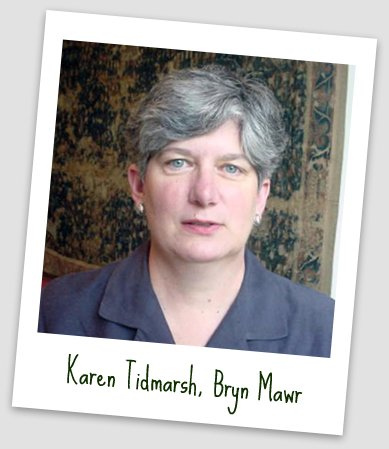The former Bryn Mawr dean is back to devise a program of academic support for students
By Amanda Kennedy
Karen Tidmarsh thinks her new office at Bryn Mawr College is too quiet.
The silence is unfamiliar to her. When she was Dean of the College, the hustle and bustle of Taylor Hall was a part of daily life. Now, Tidmarsh, 61, of Haverford, is prepared for a new position the college has created for her-Director of Academic Enhancement Programs.
Tidmarsh is in the process of making her office her own. A bare wooden bookshelf covers an entire wall behind her. The only bright spot in the room is Tidmarsh’s raspberry-hued sweater, which she pulls snugly to her neck. Boxes with her name printed in blocky black letters cram the few windowsills she has in her room in Canaday, remnants from her previous office in Taylor Hall.
Tidmarsh has filled many roles during her time at Bryn Mawr-student, dean, associate director of admissions, and English professor. Now, as Director of Academic Enhancement Programs, she plans to focus on improving the availability of academic support for students. Other universities have such academic support systems in place, and Tidmarsh has been trying to determine what will work best at Bryn Mawr.
 Tidmarsh realizes that some students have an easier time adapting to college than others. “If they’re good at it and figure it out quickly-great,” she said. “And if not they almost have to fall on their face before they can begin to be successful. And some of them are never as successful as they deserve to be because they don’t have the study skills that a place like this demands.”
Tidmarsh realizes that some students have an easier time adapting to college than others. “If they’re good at it and figure it out quickly-great,” she said. “And if not they almost have to fall on their face before they can begin to be successful. And some of them are never as successful as they deserve to be because they don’t have the study skills that a place like this demands.”
She feels that Bryn Mawr has not been successful in reaching out to students who need academic support, especially international students and minority students.
A changing student body
“I think we can certainly do better,” she said.
The make-up of the student body has changed dramatically since Tidmarsh first became a student in 1967. “When I was there, diversity was really black and white,” she said, and international students made up about five percent of the student body. Last year, they comprised nearly 19 percent. This year, Bryn Mawr welcomed its largest number of international students into its freshman class-more than 25 percent. As the campus becomes more diverse, Tidmarsh realizes that academic support programs are becoming increasingly necessary.
When Tidmarsh was freshman, students played bridge, smoked cigarettes in dorm back-smokers and had to wear skirts to class and dean’s meetings on the second floor of Taylor-a floor Tidmarsh would eventually come to know very well.
Students voted out many of these rules during her sophomore year. “The skirts to class rule went pretty fast,” Tidmarsh said.
Tidmarsh and other students also became more politically active in response to the Vietnam War during her sophomore year. Classes no longer became mandatory. Professors’ dedication to a cause greater than reading literary works inspired Tidmarsh. They became just as involved in war protests as students did, and some questioned the importance of their subject matter while teaching it.
She remembers her professors saying, “Why do I teach Chaucer when America is at war, and there are children dying on the streets? What could Chaucer possibly say to this?” She said, “For someone who was majoring in English and loved literature, it was so moving to have them say why does literature matter in a time like this and why does Chaucer matter…It was a real bonus.”
No gender politics
Talking of her experiences at Bryn Mawr, Tidmarsh directs her blue eyes at a point on the blank wall in front of her. As a student and later as a faculty member at Bryn Mawr beginning in 1980, she said she never had to worry about gender politics.
“When I worked with men on committees and as administrators here, I just assumed they took women seriously because, why else would they be there?” she said.
It was a different story when Tidmarsh taught at Germantown Friends School in 1972, a time when women were striving to achieve equal rights. She discovered during a faculty meeting that male teachers’ salaries were significantly higher than their female counterparts. The men argued that they had families to support.
“Many women went ballistic, as they should have,” she said. “The women’s movement just happened, and it hadn’t quite caught on yet that that kind of assumption is just so unfair, basing salaries on what you think a family needs as opposed to the jobs being paid for.”
When she came back to Bryn Mawr as an administrator in 1980, she appreciated how women not only were regarded with respect and admiration but also felt empowered by the institution itself.
“The most exciting and most satisfying part of my work here was sort of seeing how students over four years grew and developed in confidence of who they were and what they wanted to do,” she said, “and for a certain percentage of them, it happened very differently and better because they were in a single-sex environment.”
Bryn Mawr also helped Tidmarsh to develop her voice. Initially “shy like Garrison Keillor,” she said that she became more involved in campus activities and talked more in class. Summers spent with her male cousins gave her opportunities to speak up. She no longer just listened to their conversations, but instead, “I suddenly had lots to say, and I felt that Bryn Mawr had a lot do with that for me.”
